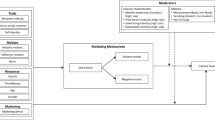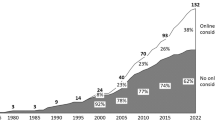Abstract
Research on consumer and market behavior related to prices has increased remarkably in recent years. Researchers have paid special attention to the effects of price perception in consumer purchasing processes. In this paper a model of antecedents and consequences of consumer price fairness perception in an online hotel booking setting is proposed. The results show that consumers use reference prices and are guided by their familiarity with online hotel bookings in determining price fairness. Moreover, when consumers perceive prices as fair, they show more confidence in the decisions made and are more satisfied with the price. However, there is no direct influence on loyalty, although this relationship appears indirectly through satisfaction with the price and confidence in the decision.


Similar content being viewed by others
References
Anderson, R. E., & Srinivasan, S. (2003). E-satisfaction and e-loyalty: A contingency framework. Psychology & Marketing, 20(2), 123–138.
Bagozzi, R. P., & Yi, Y. (1988). On the evaluation of structural equation models. Journal of the Academy of Marketing Science, 16(1), 74–94.
Bearden, W. O., Hardesty, D. M., & Rose, R. L. (2001). Consumer self-confidence: Refinements in conceptualization and measurement. Journal of Consumer Research, 28(1), 121–134.
Bei, L. T., & Chiao, Y. C. (2001). An integrated model for the effects of perceived product, perceived service quality. Journal of Consumer Satisfaction, Dissatisfaction and Complaining Behavior, 14, 125–140.
Beldona, S., & Kwansa, F. (2008). The impact of cultural orientation on perceived fairness over demand-based pricing. International Journal of Hospitality Management, 27, 594–603.
Berné, C., Pedraja, M., & Rivera, P. (1998). La búsqueda de información sobre precios en el mercado minorista de alimentación. Distribución y Consumo, 42, 45–53.
Biswas, A., & Blair, E. A. (1991). Contextual effects of reference prices in retail advertisements. Journal of Marketing, 55, 1–12.
Bolton, L. E., Warlop, L., & Alba, J. W. (2003). Consumer perceptions of price (un)fairness. Journal of Consumer Research, 29, 474–491.
Bolton, L. E., Keh, H. T., & Alba, J. W. (2010). How do price fairness perceptions differ across culture? Journal of Marketing Research, 47, 564–576.
Bruhn, M., & Grund, M. A. (2000). Theory, development, and implementation of national customer satisfaction indices: The Swiss index of customer satisfaction (SWICS). Total Quality Management, 11(7), 1017–1028.
Campbell, M. C. (1999). Perceptions of price unfairness: Antecedents and consequences. Journal of Marketing Research, 36(2), 187–199.
Cater, B., & Zabkar, V. (2009). Antecedents and consequences of commitment in marketing research services: The client’s perspective. Industrial Marketing Management, 38, 785–795.
Chelminski, P., & Coulter, R. A. (2007). On market mavens and consumer self-confidence: A cross-cultural study. Psychology & Marketing, 24(1), 69–91.
Fornell, C., Johnson, M. D., Anderson, E. W., Cha, J., & Everitt, B. (1996). The American customer satisfaction index: Nature, purpose, and findings. Journal of Marketing, 60, 7–18.
Fornell, C., & Larcker, D. F. (1981). Evaluating structural equations models with unobservable variables and measurement error. Journal of Marketing Research, 18, 39–50.
Friesen, M. (2005). Perceived price fairness in the airline industry. Sib Kongress. Retrieved March 5, 2013 from http://www.garsonline.de/Downloads/050609/Friesen_paper.pdf.
Gielissen, R., Dutilh, C., & Graafland, J. (2008). Perceptions of price fairness: An empirical research. Business & Society, 47(3), 370–389.
Homburg, C., Hoyer, W. D., & Koschate, N. (2005). Customers’ reactions to price increases: Do customer satisfaction and perceived motive fairness matter? Academy of Marketing Science, 33(1), 36–50.
Huang, J. H., Chang, C. T., & Chen, C. (2005). Perceived fairness of pricing on the Internet. Journal of Economic Psychology, 26(1), 343–361.
Kahneman, D., Knetsch, J. L., & Thaler, R. (1986a). Fairness and the assumptions of economics. Journal of Business, 59(4), 285–300.
Kahneman, D., Knetsch, J. L., & Thaler, R. (1986b). Fairness as a constraint on profit seeking: Entitlements in the market. The American Economic Review, 76(4), 728–741.
Kauffman, R. J., Hsiangchu, L., & Ho, C. T. (2010). Incentive mechanisms, fairness and participation in online group-buying auctions. Electronic Commerce Research and Applications, 9, 249–262.
Kim, M. J., Chung, N., & Lee, C. K. (2011). The effect of perceived trust on electronic commerce: Shopping online for tourism products and services in South Korea. Tourism Management, 32, 256–265.
Lee, P. M. (2002). Behavioral model of online purchasers in e-commerce environment. Electronic Commerce Research, 2, 75–85.
Leloup, B., & Deveaux, L. (2001). Dynamic pricing on the Internet: Theory and simulations. Electronic Commerce Research, 1, 265–276.
Lichtenstein, D. R., & Bearden, W. O. (1988). An investigation of consumer evaluations of reference price discount claims. Journal of Business Research, 8, 189–200.
Lockyer, T. (2005). The perceived importance of price as one hotel selection dimension. Tourism Management, 26, 529–537.
Martin, W. C., Ponder, N., & Lueg, J. E. (2009). Price fairness perceptions and customer loyalty in a retail context. Journal of Business Research, 62, 588–593.
Martín-Consuegra, D., Molina, A., & Esteban, A. (2007). An integrated model of price, satisfaction and loyalty: An empirical analysis in the service sector. Journal of Product & Brand Management, 16(7), 459–468.
Matzler, K., Würtele, A., & Renzl, B. (2006). Dimensions of price satisfaction: A study in the retail banking industry. International Journal of Bank Marketing, 24(4), 216–231.
Maxham, J. G., & Netemeyer, R. G. (2002). Modeling customer perceptions of complaint handling over time: The effects of perceived justice on satisfaction and intent. Journal of Retailing, 78, 239–255.
Maxwell, S. (2008). The price is wrong: Understanding what makes a price seem fair and the true cost of unfair pricing. New Jersey: Wiley.
Monroe, K. B. (1973). Buyers’ subjective perceptions of price. Journal of Marketing Research, 10, 70–80.
Monroe, K. B., & Xia, L. (2006). The price is unfair! Reforming pricing management. In J. N. Sheth & R. S. Sisodia (Eds.), Does marketing need reform? (pp. 158–165). New York: Sharpe.
Noone, B. M., & Mattila, A. S. (2009). Hotel revenue management and the Internet: The effect of price presentation strategies on customers’ willingness to book. International Journal of Hospitality Management, 28(2), 272–279.
Nunnally, J., & Bernstein, I. (1994). Psychometric theory. New York: McGraw Hill.
Ordóñez, L. D., Connolly, T., & Coughlan, R. (2000). Multiple reference points in satisfaction and fairness assessment. Journal of Behavioral Decision Making, 13(3), 329–344.
Rauyruen, P., & Miller, K. E. (2007). Relationship quality as a predictor of B2B customer loyalty. Journal of Business Research, 60, 21–31.
Reichheld, F. F., Markey, R. G., & Hopton, C. (2000). E-customer loyalty-applying the traditional rules of business for online success. European Business Journal, 12(4), 173–179.
Rohlfs, K. V., & Kimes, S. E. (2007). Customer’ perceptions of best available hotel rates. The Cornell Hotel and Restaurant Administration Quarterly, 48(2), 151–162.
Sanchez-Franco, M. J., Villarejo, A. F., & Martin, F. A. (2009). The moderating effect of gender on relationship quality and loyalty toward Internet service providers. Information and Management, 46(3), 196–202.
Seiders, K., & Berry, L. L. (1998). Service fairness: What it is and why it matters. The Academy of Management Executive, 12(2), 8–20.
Sirdeshmukh, D., Singh, J., & Sabol, B. (2002). Consumer trust, value, and loyalty in relational exchanges. Journal of Marketing, 66(1), 15–37.
Singh, J., & Sirdeshmukh, D. (2000). Agency and trust mechanisms in consumer satisfaction and loyalty judgments. Journal of the Academy of Marketing Science, 28(1), 150–167.
Söderlund, M. (2006). Measuring customer loyalty with multi-item scales. International Journal of Service Industry Management, 17(1), 76–98.
Sonal, K., & Preeta, V. (2005). Practices, perceptions and avenues of net-based promotions. Electronic Commerce Research, 5, 401–424.
Sotiriadis, M. D., & Zyl, C. (2013). Electronic word-of-mouth and online reviews in tourism services: The use of twitter by tourists. Electronic Commerce Research, 13, 103–124.
Tenenhaus, M., Vinzi, V. E., Chatelin, Y. M., & Lauro, C. (2005). PLS path modeling. Computational Statistics & Data Analysis, 48(1), 159–205.
Valvi, A. C., & Fragkos, K. C. (2012). Critical review of the e-loyalty literature: A purchase-centred framework. Electronic Commerce Research, 12, 331–378.
Varki, S., & Colgate, M. (2001). The role of price perceptions in an integrated model of behavioral intentions. Journal of Service Research, 3(3), 232–240.
Völckner, F., & Hofmann, J. (2007). The price-perceived quality relationship: A meta-analytic review and assessment of its determinants. Marketing Letters, 18(3), 181–196.
Voss, G. B., Parasuraman, A., & Grewal, D. (1998). The roles of price, performance, and expectations in determining satisfaction in service exchanges. Journal of Marketing, 62(4), 46–61.
Waldeck, R. (2005). Prices in a shopbot market. Electronic Commerce Research, 5, 367–381.
Wetzels, M., Odekerken-Schroder, G., & Van Oppen, C. (2009). Using PLS path modeling for assessing hierarchical construct models: Guidelines and empirical illustration. MIS Quarterly, 33(1), 177–195.
Wirtz, J., & Kimes, S. E. (2007). The moderating role of familiarity in fairness perceptions of revenue management pricing. Journal of Service Research, 9(3), 229–240.
Yoonjoung, C., & Lee, S. (2011). Influencies of consumer characteristics on fairness perceptions of revenue management pricing in the hotel industry. International Journal of Hospitality Management, 30, 243–251.
Yu, S. F. (2008). Price perception of online airline ticket shoppers. Journal of Air Transport Management, 14(2), 66–69.
Zeithaml, V. A., Berry, L. L., & Parasuraman, A. (1996). The behavioral consequences of service quality. Journal of Marketing, 60, 31–46.
Zielke, S. (2008). Exploring asymmetric effects in the formation of retail price satisfaction. Journal of Retailing and Consumer Services, 15, 335–347.
Author information
Authors and Affiliations
Corresponding author
Rights and permissions
About this article
Cite this article
Andrés-Martínez, ME., Gómez-Borja, MÁ. & Mondéjar-Jiménez, JA. A model to evaluate the effects of price fairness perception in online hotel booking. Electron Commer Res 14, 171–187 (2014). https://doi.org/10.1007/s10660-014-9137-4
Published:
Issue Date:
DOI: https://doi.org/10.1007/s10660-014-9137-4




